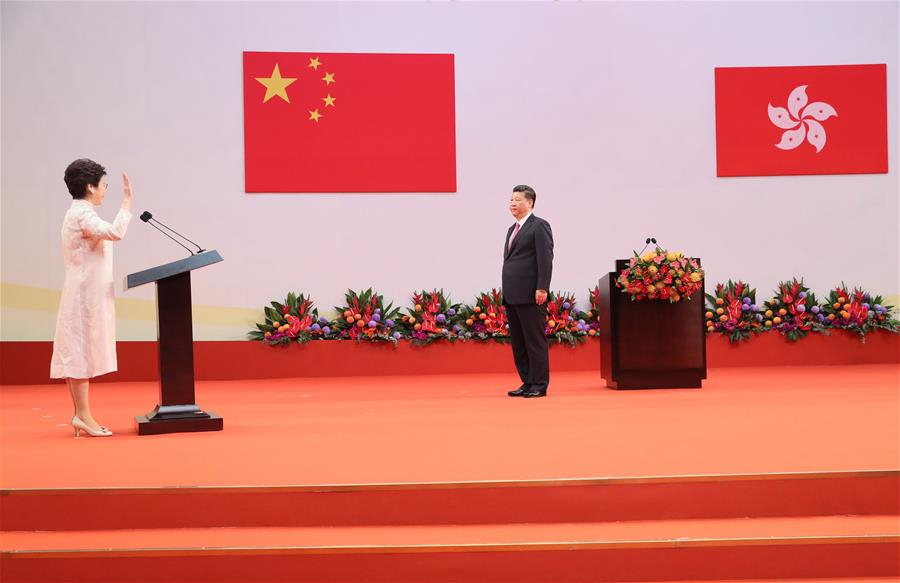
July 1, 2017: Carrie Lam (L) is sworn in as Hong Kong's chief executive before Chinese President Xi Jinping at Hong Kong Convention and Exhibition Center in Hong Kong, south China. ( Photo: Xinhua)
The government of China's Hong Kong Special Administrative Region (HKSAR) has stood firm on the fundamental principle of "One Country" and "major issues of right and wrong" during the past year, said Carrie Lam Cheng Yuet-ngor, chief executive of the HKSAR. Her government has shown zero tolerance on behaviors that challenge the bottom line of the country, she stressed.
Lam, who was sworn in as Hong Kong's chief executive on July 1 last year, made the remarks on Sunday at a banquet celebrating the 21st anniversary of Hong Kong's return to China and the establishment of the HKSAR.
Hong Kong returned to China from British rule on July 1, 1997. Since then, principles of "One Country, Two Systems" and "Hong Kong people administering Hong Kong" with a high degree of autonomy have been implemented on the territory.
In his speech last year marking the 20th anniversary of Hong Kong's return to China, Chinese President Xi Jinping drew a red line: "Any attempt to endanger national sovereignty and security, challenge the power of the central government and the authority of the Basic Law of the HKSAR or use Hong Kong to carry out infiltration and sabotage activities against the mainland is an act that crosses the red line, and is absolutely impermissible."
Explaining the relationship between "One Country" and "Two Systems," Xi said efforts should be made to uphold the "One Country" principle and maintain the central government's power, and differences between "Two Systems" should also be respected and the HKSAR's high degree of autonomy must be guaranteed.
Other representatives attending Sunday's banquet included two former chief executives of Hong Kong, Tung Chee-hwa and Leung Chun-ying, as well as Wang Zhimin, director of the Liaison Office of the Central People's Government in the HKSAR, and senior officials of the HKSAR government.
A flag-raising ceremony was held at the Golden Bauhinia Square before the banquet. Flags of the People's Republic of China and the HKSAR were raised as Lam and other officials sang the Chinese national anthem.
Regional integration
China will soon unveil and implement a plan for building the Guangdong-Hong Kong-Macao Greater Bay Area to promote regional development and integrate Hong Kong and Macao's development plans with that of the mainland, Chinese Premier Li Keqiang announced at a press conference on March 20.
Landmark projects to carry out the plan include the Hong Kong-Zhuhai-Macao Bridgeand the Guangzhou-Shenzhen-Hong Kong Express Rail Link.
The Greater Bay Area, incorporating the HKSAR, the Macao SAR and nine cities in south China's Guangdong Province, namely Guangzhou, Shenzhen, Zhuhai, Dongguan, Huizhou, Zhongshan, Foshan, Zhaoqing and Jiangmen, boasts a solid foundation and has great potential to be at the forefront of China's opening-up and an important engine of its development.
With a population of more than 66 million, it is roughly the size of big European countries like France, the UK or Italy; with an annual GDP of more than 1.5 trillion US dollars, it can compete with economies like South Korea, Russia, Australia or Spain.
The Greater Bay Area has been dubbed the fourth major bay area in the world by Chinese media, grouping it with renowned bay areas around New York and San Francisco in the US and Tokyo in Japan.


